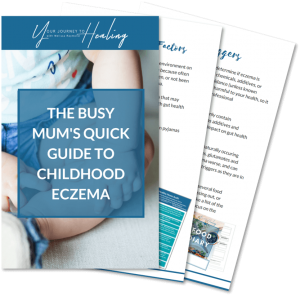One of the most common questions about eczema I receive is: What is the best probiotic to take for eczema?
I love hearing this question! It means that many parents are becoming aware that eczema is not just about creams and skin.
That gut health is a key piece of the puzzle to eczema, and that probiotics may help to improve gut health.
Within our gut lies a community of microorganisms, also known as our gut microbiota. A wide diversity of different gut microorganisms is generally associated with better health. Research shows that those with eczema have a lower diversity compared with those without eczema.
Many parents of kids with eczema want to move beyond the creams… beyond the band-aid solution to their symptoms. They want to delve deeper into the root causes to seek long-lasting relief.
That’s where I love to getting involved. I love delving into the research – I’m the research nerd so you don’t have to be! To pull the right information all into the one place…
This allows parents to shortcut straight to the bigger picture information and get on with taking action.
So, what does the research tell us about probiotics and eczema?
First stop for me, is The Cochrane Database of Systematic Reviews. Here, researchers complete comprehensive reviews on the current research on a particular topic. These are the Cochrane Reviews.
Recently, they completed one on probiotics for eczema. The findings were a little disappointing.
The reviewers found that probiotics alone were not effective in improving eczema. This was in comparison to no probiotics, or a different treatment.
As a parent of a child who used to have eczema, I understand the disappointment at this conclusion.
I have also felt the deep desire to find the one solution that will Just.Fix. Everything.
Unfortunately, it isn’t that simple.
Why not might a probiotic itself not help improve eczema symptoms?
Because our gut microbiota is complex.
Probiotics only remain in our guts for a maximum of 2-3 weeks. Plus, they do not colonise (start growing and take a hold) in our guts. This means that for health benefits we need to taken them ongoing.
We also need to feed our beneficial bacteria so they can grow… we can do this through diet and other prebiotic supplements.
Sometimes there may be potentially harmful microorganisms that may also need addressing.
Research is always evolving, and the science is never ‘solved’.
The world of probiotics is expanding at an exponential rate.
So what can we take from this?
It’s not all bad.
Improving our gut microbiota diversity and health are good places to start. This includes foods to nourish our health AND our gut microbiota…
…Probiotic may play a part of the piece of the puzzle, but nothing works in isolation. Studies are yet to investigate combining more therapies together.
Consider stool microbiota testing for a targeted therapy before taking a random probiotic…
Examine the foods that are being consumed, because what we eat, feed our bacteria in our gut.
Feeding the beneficial bacteria may help overcome some of these skin issues. Feeding the potentially pathogenic (“bad” bacteria) may make it the skin worse.
Take a look at food, supplements, prebiotics, inflammatory foods. A good place to start is using a food diary to track what you’re eating over time.
Then we start to branch out and look at other aspects. These include genetics, environment, lifestyle, and all the other key factors of eczema.
These are some of the pieces of the puzzle. To help more than the skin-only, one-dimensional approach.
Spend less time on finding the best probiotic and start viewing eczema with the bigger picture in mind.
Melissa is offering her Busy Mum’s Quick Guide to Childhood Eczema for FREE.
Just click on this link: http://bit.ly/Busy-Mums-Eczema
You may also like to read:
What’s the Deal with Gut Microbiota?










